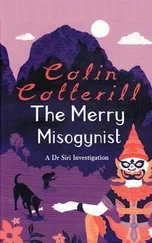Colin Cotterill - The Woman Who Wouldn't die
Здесь есть возможность читать онлайн «Colin Cotterill - The Woman Who Wouldn't die» весь текст электронной книги совершенно бесплатно (целиком полную версию без сокращений). В некоторых случаях можно слушать аудио, скачать через торрент в формате fb2 и присутствует краткое содержание. Жанр: Триллер, на английском языке. Описание произведения, (предисловие) а так же отзывы посетителей доступны на портале библиотеки ЛибКат.
- Название:The Woman Who Wouldn't die
- Автор:
- Жанр:
- Год:неизвестен
- ISBN:нет данных
- Рейтинг книги:3 / 5. Голосов: 1
-
Избранное:Добавить в избранное
- Отзывы:
-
Ваша оценка:
- 60
- 1
- 2
- 3
- 4
- 5
The Woman Who Wouldn't die: краткое содержание, описание и аннотация
Предлагаем к чтению аннотацию, описание, краткое содержание или предисловие (зависит от того, что написал сам автор книги «The Woman Who Wouldn't die»). Если вы не нашли необходимую информацию о книге — напишите в комментариях, мы постараемся отыскать её.
The Woman Who Wouldn't die — читать онлайн бесплатно полную книгу (весь текст) целиком
Ниже представлен текст книги, разбитый по страницам. Система сохранения места последней прочитанной страницы, позволяет с удобством читать онлайн бесплатно книгу «The Woman Who Wouldn't die», без необходимости каждый раз заново искать на чём Вы остановились. Поставьте закладку, и сможете в любой момент перейти на страницу, на которой закончили чтение.
Интервал:
Закладка:
He turned to her as if suddenly remembering she was in the room.
Dtui lunged with the knife.
He held up his left hand like a policeman stopping traffic.
She lunged again and the blade cut a ribbon of red across his palm.
He looked disappointed. His hand gushed blood but he seemed not to care.
Dtui felt this was all without hope. He was a living cadaver and there was nothing she could do to frighten him. Still he talked.
‘It is a shame,’ he said, his bloody dripping hand still held aloft. ‘Two generations of lotus eaters gone in one small massacre. It will never make the newspapers in Europe.’
He took that decisive step forward just as the louvres above Dtui’s head shattered, sending a hailstorm of glass across the room. The Frenchman showed no defensive instincts. It was as if he were staring into snow. Glass pierced the skin of his face as he looked up towards the source of this interruption.
‘You’re surrounded,’ came a deep male voice speaking English from beyond the window.
This was followed by the sound of a gunshot.
‘We know you’re in there. Come out with your hands in the air.’
Barnard sighed. He looked at the mother and daughter as if contemplating whether he might have time to beat them to death. He twirled the metal bar around like a conductor exercising his baton and he pouted. Then, he turned and walked calmly to the door with his weapon held above his head.
Dtui’s knees buckled and she slid down the wall to the concrete floor. Malee, who had held back her tears this whole time, suddenly released a flood. Dtui willed her own breath to return. Her heart to beat. The ink blots to clear from before her eyes. She waited for the sounds of yells and gunshots from outside. Of a chase. Of a killing. But there was nothing. In fact there were no sounds beyond the cries of her daughter. She calmed the girl with a lullaby and, some five minutes later, eased herself back to her feet. She placed Malee in her hammock and walked on unsure legs to the exit. She peeked nervously around the door frame. There was nothing untoward. Mahosot was its normal sleepy self. There was no sign of the crazed Frenchman.
A nurse emerged from the midday shadows of the canteen, her crisp white uniform reflecting the sun like a solar panel.
‘How are you, Dtui?’ she called, calmly, as if the world had not, five minutes earlier, been about to end.
‘Did you see a … a farang , just now?’ Dtui asked.
‘The Soviet doctor was just …’ the nurse began.
‘No. A tall, old man. Blue shirt. Carrying a leather satchel.’
‘Nope.’
‘Anything unusual? Police? People running?’
‘Dtui, are you all right?’ asked the nurse.
‘I don’t know,’ Dtui confessed.
Something had happened that she couldn’t explain. A broken window. A voice she’d never heard before. A gunshot. Two lives saved. A miracle.
At first it might have seemed odd that a landlocked country should have a navy. It was something like tropical Singapore listing a snow plough amongst its official vehicles — which it did. But when one considered the fact that Laos had a five-thousand kilometre border to police, a thousand of which was river, it began to make more sense. The Lao People’s Navy comprised twenty US-made river patrol boats, sixteen amphibious landing craft and two fairly large cruisers that couldn’t be used in the dry season.
When one of the cruisers arrived in Pak Lai mid-Monday afternoon, the crowd cheered, believing it was part of the celebrations. The vessel ignored the current race and ploughed between the two longboats, causing both to capsize in its wake. The crowd went wild with enthusiasm. They seemed to cheer every damned thing. There wasn’t a bottle to be seen anywhere but those Sanyaburans were most certainly on something.
The cruiser reached the wooden dock and, unlike the ferry, did not berth politely. It seemed to use the flimsy structure as a brake to arrest its charge upriver. The pier creaked and leaned at a precarious forty-five degree angle but did not give up its moorings. Sailors fore and aft tied off on the wooden posts. Ten unenthusiastic army engineers in a mismatch of uniforms ambled across the deck and strolled along the jetty. The boat was piled high with heavy equipment, even a bulldozer rocked precariously at the stern. The engineers had arrived.
At almost the same time, met with the same frenzied cheers, the ferry appeared upstream. It had left Luang Prabang with Comrade Civilai as its only passenger but was now full to the brim. At every turn in the river, every small village, it had taken on revellers intent on enjoying the Pak Lai boat races. None of them had laissez-passers but who was checking? At heart, the Lao were party animals and the zoo had been quiet of late.
The ferry leaned against the dock from the north side, setting it upright. The passengers were off the boat in seconds and mingling with the huge crowd. Civilai, who was absolutely, most certainly, and definitely on something, staggered to the wrong side of the ferry and was about to step into the Mekhong. The pilot rescued him in time and deposited the old politburo man and his travel bag on the shifting jetty. Siri was there to meet him.
‘Have a rough cruise did you, skipper?’ Siri smiled.
Civilai’s eyes were no longer coordinated. The cord seemed to have snapped. One was overseeing the river while the other honed in on Siri.
‘Those … these Sayabung people,’ he slurred, ‘are all nuts. You wouldn’t believe how … how … who much a person could smoke, and snort and ingest in a four horse period. Or, hours, of course — even.’
‘Oh, I believe it, old brother,’ said Siri. ‘In fact your eyes have no pupils.’
Civilai began to scan the jetty beneath his feet and check his pockets.
‘I had them,’ he said. ‘I know I left Lang Praboon with them. And did I say … passionate?’
‘Who?’
‘The Sangbarani women.’
‘Say no more, old man. I know your wife.’
‘I need …’
‘Some sleep.’
‘How …?’
‘I’m psychic.’
‘You’re not. You’re a-’
‘I know. Let’s go.’
Siri propped up his friend as they walked the short walk to the guest house.
‘Who are you taking me, you villain?’ Civilai asked.
‘To my bed.’
‘Good. Will Mademoiselle Daeng be joining us?’
‘I doubt it. She’s not talking to me.’
‘At last a natural marriage. All this lalalala love at your age. Totalement obscene. Did you take on a concubine, you old snakehead? That’s the test.’
Civilai had apparently lost the use of his legs as Siri was now dragging him along the gravel path. Despite his large stomach he weighed surprisingly little.
‘What would I do with a concubine at my age?’ Siri asked.
‘Nothing. That’s the point. You just dress her up sexy and walk her around around town and everyone thinks you’re Valentino. At your dis … discreet love nest you sit and play backgammonon and on and you eat scones.’
They were passing the engineers. Young men. Undisciplined. Rude.
‘Looks like the old queens are going to get lucky this afternoon,’ shouted one of them to a parry of laughter.
Siri stopped and Civilai almost slipped through his grasp. It wasn’t the comment that caused Siri to pause — although he would normally take a few moments to make mincemeat of the young soldier — it was the language he’d spoken. Siri looked around at the boys in the unit. Sharp, angular cheekbones. Chinese eyes. The engineers were all Vietnamese.
To come across a unit of Vietnamese soldiers at that time would not have been unexpected. There were an estimated forty thousand of them on Lao soil ‘easing the transition’. When still active and able to stand, Civilai had once stood up in front of the committee and suggested that the Vietnamese invasion of Laos had already happened but nobody was prepared to admit it, particularly the numerous party members of mixed, Vietnamese-Lao ethnicity. The Vietnamese labour force dragged in by the French oppressors had been encouraged to spread its seed, one might say, at the grass roots level. There were currently ‘advisors’ in each of the ministries and the recent memorandum of understanding had given Vietnam a licence to trade and pillage.
Читать дальшеИнтервал:
Закладка:
Похожие книги на «The Woman Who Wouldn't die»
Представляем Вашему вниманию похожие книги на «The Woman Who Wouldn't die» списком для выбора. Мы отобрали схожую по названию и смыслу литературу в надежде предоставить читателям больше вариантов отыскать новые, интересные, ещё непрочитанные произведения.
Обсуждение, отзывы о книге «The Woman Who Wouldn't die» и просто собственные мнения читателей. Оставьте ваши комментарии, напишите, что Вы думаете о произведении, его смысле или главных героях. Укажите что конкретно понравилось, а что нет, и почему Вы так считаете.












